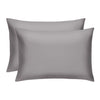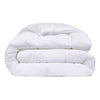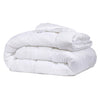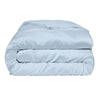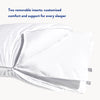The Daily Miracle
Why Do I Keep Waking Up at Night?
Published
May 22, 2023
Author
Bridget Reed

We’ve all been there. You settle down for a restful night’s sleep, exhausted and ready to recover from a long, stressful day…only to wake up a few hours later. Usually, it should be easy to fall asleep when something wakes you up, whether it’s the temperature, a loud noise outside, or a pet or partner rolling over next to you.
But sometimes, you find yourself wide awake, the time on your morning alarm coming closer and closer, with no hope of getting enough sleep before it’s time to go to work. This feeling is even worse if you can’t fall asleep in the first place and then find yourself waking up at 3am.
If you constantly ask, “Why do I wake up at 3am?” keep reading. Let’s talk about why you’re having trouble staying asleep so you can figure out how to sleep through the night without waking up. We may not answer “What causes insomnia?” but we can definitely help you sleep a bit sounder.
Temperature
Temperature is one of the most common reasons for repeated awakenings throughout the night. While you know it’s difficult to go to sleep when your room feels too warm or too cold, there is an optimal sleep temperature to enable deep sleep — between 60 and 67 degrees Fahrenheit.
If you find yourself waking up to night sweats, it may be getting in the way of your REM sleep — one of the most vital sleep stages for overall sleep quality.
In addition to opening windows or turning up your air conditioning at night, finding sheets that breathe and help you maintain the perfect temperature throughout the night can really improve your sleep quality. Our Miracle Made Sheet Set stays at the perfect temperature all night long, leading to better sleep.
Some studies have also shown that taking a warm bath or a warm shower up to two hours before bedtime may help you fall asleep faster by lowering your body temperature.
A lower core temperature signals your circadian rhythm that it’s time to go to sleep, and staying at a more comfortable temperature while you sleep will make it more likely you stay asleep throughout the night, too.
Sleep Hygiene
Sleep hygiene doesn’t exactly refer to cleanliness, which is what we usually think of when the word “hygiene” is used. It’s more about your bedtime routine and sleep environment. Good practices around this can sometimes be the key to saying good night to insomnia for good.
If you have trouble sleeping, napping during the day can affect the hours of sleep you get in the evening. It’s also best to keep a regular sleep schedule so that your body can adjust, making it more likely you’ll be able to sleep throughout the night.
If you sometimes go to bed at 9 p.m. and sometimes go to bed at 3 o’clock in the morning, it’s no wonder your body is having trouble staying asleep all night!
Likewise, using electronic devices as part of your bedtime routine can negatively impact how your body goes through each sleep cycle. Blue light interrupts your circadian rhythm and signals your body to stay awake.
You’ll also want to avoid any blue light or other interruptions in your sleep environment. So if you’re accustomed to falling asleep with your television on… this is your signal to turn it off at least an hour before you plan to go to sleep.
Lifestyle Factors
Certain lifestyle factors may be affecting your ability to sleep through the night. While sleeping with your partner or your pets may feel cozy when you’re settling in, if they snore or move in their sleep, your nighttime awakenings could be related to these common sleep disturbances.
And while having a few drinks before bed may seem to lead to sleepiness, it’s actually more likely to lead to interrupted sleep or insomnia throughout the night. Not only that, but if you fall asleep after a big night out, it’s also more likely that you’ll wake up in the night needing to use the bathroom. Urination is also another common cause of interrupted sleep.
Mental Health
It’s common knowledge that stress can affect your sleep habits. If you’re waking up in the night due to stress or anxiety, it may be worth speaking to your doctor about taking melatonin before bed to help you sleep more deeply. In the long term, cognitive behavioral therapy or even something as simple as regular exercise may help lower your stress levels.
But, interrupted sleep can also be due to side effects from some common treatments for mental health issues. Antidepressants can negatively affect your sleep. And if you have ADHD or related conditions, any stimulants you take can raise your blood pressure and make it hard for you to wind down at the end of the night.
Medical Conditions
There are actually many health conditions, both chronic and temporary, that may be causing your insomnia. Sleep disorders such as obstructive sleep apnea can naturally cause sleep problems, and you may need to visit a sleep expert or healthcare provider for a sleep study.
CPAP machines usually resolve sleep apnea once you’re diagnosed and may immediately improve your sleep. More generally, seemingly unrelated conditions such as an overactive thyroid or restless legs syndrome can cause poor sleep.
Another common health condition that interferes with uninterrupted sleep is allergies. If you’re struggling with allergies or even the common cold, congestion can make it difficult for you to breathe while asleep… which may be why you’re waking up every two hours.
In addition to anything your doctor recommends, you can minimize congestion before you sleep by using a Miracle Shower Steamer in the evening before bed.
Our Clarity Shower Steamers will transform the steam in your bathroom with the decongestant power of eucalyptus and mint. If you have allergies, they may also be exacerbated by your bedding if you aren’t washing it frequently enough.
Pillowcases can trigger allergies and make it difficult for you to sleep if you’re sensitive because you’re obviously in close contact with them. Pillowcases made from natural silver are ideal if you have allergies because silver has antimicrobial qualities that can reduce the bacteria and other impurities that cling to your pillow between washes.
Takeaway
Getting a full, restful night’s sleep impacts everything from your mood to your mental and physical performance the next day. In the long term, maintaining good sleep hygiene and ensuring you’re getting enough sleep each night can reduce your risk of a wide range of potentially serious conditions and even reduce your risk of death as you age.
So while waking up in the middle of the night may feel like nothing more than a passing frustration, it can actually have a huge impact on your overall well-being. So why do I wake up in the middle of the night? The sooner we can take steps to improve our sleeping patterns, the better it will be for us in the long term…and the better we’ll feel in the short term, too!
Sources:
Good Sleep for Good Health | News in Health
Sleep Well — and Reduce Your Risk of Dementia and Death | Harvard Health Publishing


